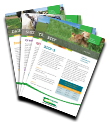
Beef Newsletter – March 2023
Beef Newsletter – March 2023 06 March 2023 Type Newsletter Download Publication (PDF) In this month’s edition: Hitting your grass targetsBoth weather and ground conditions have been excellent across the country in recent weeks. Air and soil temperatures have been well above normal, and rainfall levels have been below what we would normally expect at […]
06 March 2023
Type Newsletter
By

Beef Newsletter – March 2023
06 March 2023
Type Newsletter
Type Newsletter
Download Publication (PDF)
In this month’s edition:
- Hitting your grass targets
Both weather and ground conditions have been excellent across the country in recent weeks. Air and soil temperatures have been well above normal, and rainfall levels have been below what we would normally expect at this time of the year. With such favourable conditions, many beef farmers have rightly turned some of their cattle out to grass three to four weeks ahead of normal. This is saving them fodder, reducing the amount of slurry they will have to spread, significantly reducing their workload, and improving the daily weight gain in their cattle. - Delivering European solutions to Irish beef farmers
Between 2020 and 2023, Teagasc co-ordinated a European-funded project known as the Beef Innovation Network Europe (BovINE), that aimed to establish a knowledge exchange network between beef farmers, advisors and others involved in the beef industry across nine European countries. Each year meetings were held in the nine countries to find out what were the main challenges beef farmers had on their farms that were preventing them from becoming more sustainable. - 12 steps to reducing emissions
Over 12 months, the Teagasc advisory newsletters will outline one action per month farmers can take to reduce their emissions. This month, the focus is on step three – Optimise soil P and K. - Research Update – Rumen and methane
Paul Smith, Sinéad Waters and David Kenny of Teagasc Grange and Alan Kelly (UCD) report on the rumen microbiome and low methane-emitting beef cattle. Recent evidence from research led by Teagasc, in collaboration with the Irish Cattle Breeding Federation (ICBF) and UCD, has shown that some cattle can emit up to 30% less methane, for the same level of performance, when ranked on the basis of the residual methane emissions (RME) index. As the rumen is the sole source of enteric methane emissions, researchers in Teagasc and UCD, through the RumenPredict and EU-funded MASTER project, aimed to establish the contribution of the rumen microbial community to inter-animal divergence in methane output. - Health & Safety – Check gates and fences
Are your fences stockproof along public roads? Animals getting onto roads is a major hazard to traffic with high potential for serious injury. The Animals Act 1985 places a strong duty on farmers to prevent stock from getting onto roads. March is an opportune time to check fencing along public roads ahead of turnout of stock.
